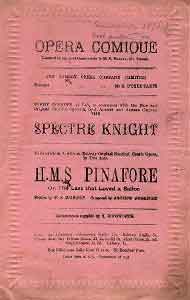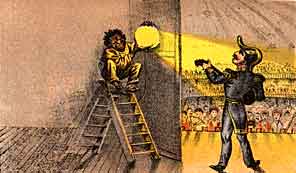Introduction
Adapted from the book "Tit-Willow or Notes and Jottings on Gilbert and Sullivan Operas" by Guy H. and Claude A. Walmisley (Privately Printed, Undated)
H.M.S. PINAFORE, or "The Lass that loved a Sailor", was produced at the Opera Comique on Saturday, 25 May, 1878, but received only very modified praise in the Press and it seemed at first as if it were going to be a failure. Unfortunately, too, just at this critical time a heat-wave spread over England which adversely affected the takings to an alarming degree—theatres became stiflingly hot and were the last places the public wished to visit at such a time.
 However, by a stroke of good fortune Sullivan played "Pinafore" at a Promenade Concert at Covent Garden and popularised it to such an extent that, the weather becoming cooler, people flocked to the Opera Comique to hear the real thing, and by the end of August "Pinafore" was the rage of London.
Gilbert, in the person of Sir Joseph Porter, K.C.B., caricatures W. H. Smith, who was M.P. for Westminster at that time—he represented Westminster from 1868 to 1885—and had risen from a newsboy to be head of the Admiralty—as First Lord; a post offered to him by Disraeli which he held from 1877 to 1880. William Henry Smith, P.C., born 24 June, 1825, an eminent statesman, married as her second husband, Emily, Viscountess Hambledon, and died in 1891.
Act I opens with a scene on the quarter-deck of H.M.S. Pinafore, off Portsmouth, with sailors busy cleaning brasswork and splicing ropes etc., when Mrs. Cripps, better known to everyone as "Little Buttercup" (a Portsmouth Bumboat Woman), enters with a basket on her arm full of snuff and tobacco and ribbons and laces etc., which she offers to the sailors, whilst singing a delightful aria, "I'm called Little Buttercup".
It is typical of Gilbert's humour to name her "Little Buttercup" for she is always portrayed as a large and comfortable matron, described later by the ship's captain as "a plump and pleasing person".
She listens as Able Seaman Ralph Rackstraw—"the smartest lad in all the fleet"—deplores the fact that he is in love with a maiden far above his station, a lady who is, in fact, none other than his own Captain's daughter, Josephine,
Captain Corcoran, Commanding H.M.S. Pinafore, enters and after politely greeting his crew, sings his famous song "I am the Captain of the Pinafore" in which quite a number of well-known phrases that are still prevalent in conversational English today have their origin. Phrases such as "I never use a big, big D", and "What, never? Hardly ever!"
Possibly a day will come when people will say of Gilbert as an old lady once said of Shakespeare on hearing one of his plays for the first time, that she didn't think much of the author as he was continually using well-known and hackneyed phrases; she failed to realize that it is we who use Shakespeare's phrases until they become hackneyed, and not he who used ours.
The Captain is perturbed at the unwillingness of his daughter to give her hand to Sir Joseph Porter K.C.B., First Lord of the Admiralty, and is horrified when he learns from her that she is secretly in love with one of his own sailors—Ralph Rackstraw.
However he hurries her off to her cabin as he sees Sir Joseph's barge approaching, in which, also, is the admiring crowd of sisters, cousins and aunts that attend him wherever he goes.
The dainty chorus of relatives come flowing in to a bright and lilting air and dance round the deck singing, "Gaily tripping, lightly skipping, flock the maidens to the shipping"; they are politely received by the sailors, but the arrival of Sir Joseph and his cousin Hebe puts a stop to their frivolity.
Sir Joseph then sings his well-known song, "When I was a lad I served a term as office boy to an Attorney's firm", telling how he had risen by diligence at office work and by successful speculation to the position of a millionaire, had afterwards entered Parliament and, thanks to his slavish demeanour in the presence of his constituents, had acquired such popularity that he was appointed by the Government to be Chief of the Navy. His golden rule is, "Stick close to your desks and never go to sea, and you all may be rulers of the Queen's Navee!"
After an informal chat to the Captain in which he impresses upon him the need for politeness when giving orders to the crew, he and his sisters and his cousins and his aunts go below.
Josephine enters from her cabin and finding Ralph alone she attempts to play the haughty lady in response to his humble protestations of love, and finally leaves him.
As the sailors return he tells them that Josephine has scorned his love and, as he cannot live without her, he is going to take his life. He puts a loaded pistol to his head, but in the nick of time Josephine appears and, to his astonishment, tells him that she loves him. They decide to steal ashore that very night and get married, but "the villain" Dick Deadeye, who is hated by the crew, decides to tell the Captain of their plot, and the Act ends with the sailors, the relatives and Josephine dancing gaily, unaware of Dick Deadeye's intentions to expose the scheme they had planned.
As the curtain rises on Act II there is almost always a murmur of appreciation from the audience. The scene is the same as Act I—the quarter-deck of H.M.S. Pinafore—but now it is night time, and a purple glow suffuses the ship; a lantern or two glimmer in the rigging, while a shaft of moonlight tends to throw the more distant parts of the deck into deeper shadow.
 The Captain, in mess uniform with a cloak about his shoulders, is singing and accompanying himself on a mandolin, while Little Buttercup is seated nearby gazing sentimentally at him.
For once it seems that Gilbert is in serious mood, especially when one hears the Captain's opening words—"Fair moon, to thee I sing, bright regent of the heavens", but almost immediately the mood changes to the comic as the song continues "Say, why is everything either at sixes or at sevens?"
When he has finished Little Buttercup sympathizes with the Captain in his troubles—his crew in rebellion; his daughter partial to a lowly tar; Sir Joseph threatening a court martial; but she tells him that she at least will stand by him, despite the difference in their stations which may not be such a stumbling block as he seems to think, as there is a change in store for him.
They then sing a duet full of well-known proverbs and fables—but at the end the unfortunate Captain is more mystified than ever by Little Buttercup's words, and fails to see at what the mystic lady is driving.
She leaves him as Sir Joseph Porter comes in to complain that Josephine appears insensible of the honour which he is condescending to show her by urging his suit.
Josephine joins them and they sing a gay and lively trio, "Never mind the why and wherefore", which gives Sir Joseph a splendid opportunity for skipping round the deck with joyous abandon. The song is invariably greeted with four or five encores until poor Sir Joseph, fanning himself furiously after his exertions, starts limping round the stage, much to the delight of the audience.
In agreeing that married happiness is not inconsistent with discrepancy in rank Sir Joseph unwittingly pleads his rival's cause and Josephine thereupon decides to marry her lowerdeck lover.
When the Captain is alone Dick Deadeye comes to advise him that his daughter is planning to elope that very night with Rackstraw. Grateful for the warning the Captain, armed with a Cat-o'-nine-tails, hides in the shadows as the crew enter on tiptoe, with Ralph, while Josephine emerges from her cabin with a bundle of clothes, and accompanied by Little Buttercup.
In an amusing ensemble they sing, very quietly, "Carefully on tiptoe stealing", but suddenly the Captain reveals himself and demands to know where Josephine is going.
To his horror, Ralph informs the Captain that he loves Josephine; and the Boatswain then sings his famous song on behalf of Ralph, "For he is an Englishman", but the Captain is so enraged at Ralph's temerity in seeking his child in marriage that, forgetting his former boast of never using "a big, big D——-", he cries out angrily, "Why, damme, it's too bad!"
Unfortunately Sir Joseph, who has appeared on the poop-deck, and his sisters and his cousins and his aunts, overhear the Captain's bad language and are shocked.
Captain Corcoran is ordered to his cabin in disgrace. But when Josephine appears and rushes to Ralph's arms Sir Joseph is even more shocked, and when he hears that Ralph wants to marry Josephine he angrily orders Ralph to be loaded with chains and taken to the cells. Ralph is led off in custody.
However, Little Buttercup explains that many years before, when practising baby-farming, she had two children in her care, one a high-born babe, the other of low condition, and unfortunately she mixed them up. "The well-born babe was Ralph", she says, "your captain was the other".
Ralph enters dressed as a captain, and takes Josephine, while the former Captain Corcoran appears as a common sailor and takes Little Buttercup; not to be outdone Sir Joseph takes his cousin Hebe and arranges a triple wedding for the following day, and so ends a very amusing and tuneful opera.
The music of "H.M.S. Pinafore" is full of merriment, yet it is remarkable that while Sullivan was composing such gay and light-hearted airs he was suffering agonies from kidney trouble.
As was only to be expected with such a successful opera various companies in America produced "Pinafore" in a number of important towns with tremendous success—eight theatres in New York alone were playing it at the same time—but they played havoc with it, introducing endless innovations of their own.
Gilbert and Sullivan, however, never received a penny in the way of royalties, so it was decided that they should take over their own companies to America and also endeavour to have the copyright laws reconstructed. Accordingly "Pinafore" was produced at the Fifth Avenue Theatre, New York, under their personal supervision-Sullivan conducting.
The result was very favourable, but it was the pirates in America—Gilbert and Sullivan being unsuccessful over the copyright law—that gave D'Oyly Carte and the authors much cause for anxiety and worry; they therefore remained in America some time in order to try and reach a satisfactory conclusion.
As the new opera, "The Pirates of Penzance", was at this time due to be produced, Gilbert and Sullivan decided to combat the lack of copyright rule by producing it in England and America simultaneously.
Meanwhile the London Company was still playing "Pinafore" to packed houses; the opera running for over two years.
Page updated 24 January 2004
|